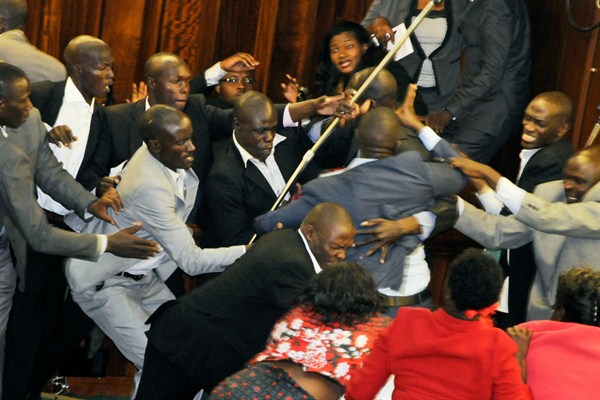Can Africa’s democracies overcome the ‘president-for-life’ phenomenon, or is democracy in Africa doomed to fade? Find out more when you subscribe to World Politics Review (WPR).
Late last year, Uganda removed a constitutional measure that barred anyone older than 75 from running for president, clearing the way for long-time President Yoweri Moseveni, 73 years old, to remain in office after his current term ends. But the aggressive and occasionally ham-handed tactics of Museveni’s ruling National Resistance Movement, or NRM, are giving rise to a new generation of opposition leaders who are set on changing this common approach to undermining democracy in Africa.
The face of the opposition has quickly become Bobi Wine, whose real name is Robert Kyagulanyi. A popular musician known in Uganda as the “ghetto president,” he won a parliamentary by-election as an independent. Wine has capitalized on his celebrity to become a unifying figure for the opposition, especially the young Ugandans who make up a disproportionately large segment of that country’s population.
Wine said that his election in a closely watched matchup had shown “we are more powerful than we have ever been, if only we choose to tap into that power.”
“We only need to multiply that and spread that all over the country and make the people in power realize that, actually, people power is stronger than people in power.”
The Ugandan opposition’s electoral prospects are muddy. The NRM has maintained a strong hold on power, especially in rural areas in which Museveni’s patronage network has made his party synonymous with government. Regardless of whatever protests may come, it seems all but inevitable that Museveni will run for office again—and win. “Democracy and politics is a game of numbers. They [the opposition] don’t have the numbers,” says Don Wanyama, the president’s spokesman.
To learn more about how Uganda’s long-time president is holding onto power, read Uganda Clears the Path for Its Own President-For-Life for FREE with your subscription to World Politics Review.
[marketing]ofie[/marketing]
Why Africa’s Presidents for Life Fear Losing Their Grip on Power
If Uganda’s Museveni and other African presidents often seek to remain in power indefinitely, there are reasons for their fear of relinquishing power. From the Democratic Republic of Congo to Togo to Burundi, the spread of democracy in Africa is meeting resistance from heads of state who have gone to great lengths, including the use of violence, to stay in office despite constitutional and institutional barriers. Maintaining their prestige is one of the many reasons why some public officials continue to cling to power. But the issue is much deeper than that. One cannot fully comprehend their obsession with staying in power without first analyzing the nature of politics in many of these countries.
To learn more about the state of democracy across Africa, read Why Africa’s ‘Presidents for Life’ Are So Afraid to Lose Power for FREE with your subscription to World Politics Review.
Do Presidents for Life Really Deliver Stability?
Already the world’s second-longest-serving non-monarch head of state, Cameroonian President Paul Biya recently won yet another re-election after 36 years in power. For decades, the international community has praised Cameroon for its peace and stability, attributes that have made it an attractive destination for foreign investment. The description of Cameroon as “a politically stable country in an unstable region” is still widely used by foreign governments and aid groups. But over the past year, well-documented abuses by the army in Cameroon’s restive Anglophone region have caused the regime’s international allies have to scrutinize the partnership, at least somewhat. The shift could also have something to do with concerns over how to keep the country stable after Biya dies.
To learn more about the vulnerability of Africa’s democracies, read the ‘The Old Don’t Let Go’: 36 Years of Rocky ‘Stability’ in Paul Biya’s Cameroon for FREE with your subscription to World Politics Review.
[marketing]ofie[/marketing]
Holding Out Hope for Democracy in Africa
The picture for democracy in Africa isn't all bleak. With the help of regional neighbors, Gambia was able to force out long-time dictator Yahya Jammeh in December 2016. The country's experience highlights the importance of transitional justice and reconciliation when a president-for-life's term runs out. Jammeh had brutally ruled the small West African nation as a veritable mafia state for more than two decades. The deeply insidious nature of Jammeh’s 22-year reign eroded public trust in Gambian institutions and confidence in the rule of law. The former president’s exploitation of ethnic differences has also left behind entrenched social fissures. The severity of the challenges facing Gambians is great, but it is also an opportunity to rebuild their nation in a way that ensures equality for all who call it home.
To learn more about the good news for Africa’s democracies, read To Ensure Its Democratic Transition, Gambia Will Need Justice – and Reconciliation for FREE with your subscription to World Politics Review.
[marketing]boilerplate[/marketing]
Editor's Note: This article was first published in August 2018 and is regularly updated.

